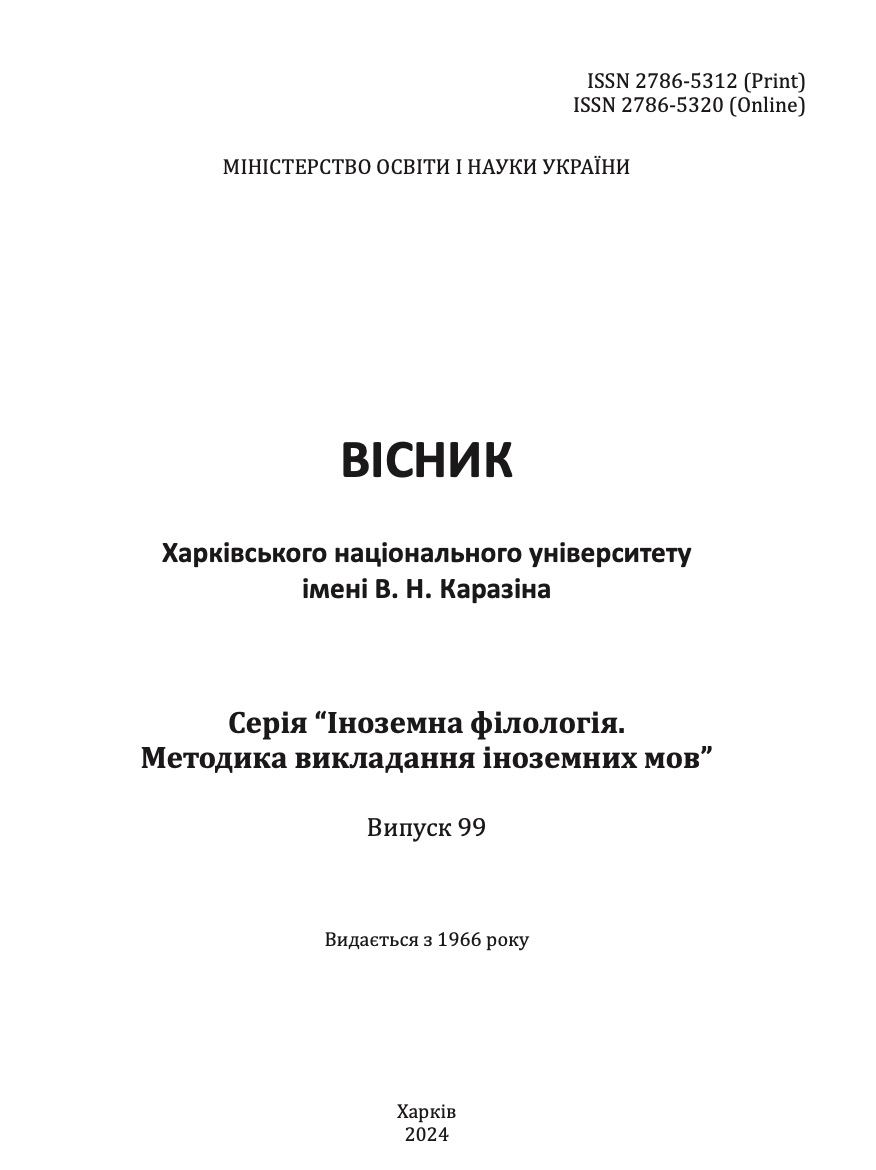Innovative approaches to development of foreign-language vocabulary: the role of modern digital tools in distance learning
Abstract
The contemporary era is marked by the extensive digitalization of society, leading to notable impacts on the educational sphere and the emergence of new challenges. Digital technologies offer vast opportunities for modernizing the educational process and ensuring educational accessibility. Integrating digital tools into education enables personalized learning, and customization of programs to students’ needs, and enhances training effectiveness. Nevertheless, the ever-evolving nature of digital technologies necessitates a continuous search for efficient utilization methods, particularly in distance education, making the presented research relevant. This paper aims to provide a comprehensive analysis of fundamental digital tools and resources currently available, which can be employed or adapted for developing the lexical aspect of foreign language communicative competence among higher education students, particularly within the framework of distance education. The work highlights the functions of using digital technologies in education and their advantages in developing foreign language lexical skills. The paper presents an analysis of various available digital resources, including electronic dictionaries, websites, mobile applications, and AI-based review tools. These methods of utilizing digital resources in language learning within higher education can enhance students’ mastery of vocabulary and overall educational quality. The results of a comprehensive analysis of basic digital technologies prove the effectiveness of electronic digital resources in teaching foreign languages at the higher education level.
Downloads
References
Veretiuk, T. (2023). Tsyfrovizatsiia v pidhotovtsi inozemnykh zdobuvachiv (v kursi «Ukrainska mova yak inozemna»): ohliad instrumentiv [Digitalization in the Training of Foreign Students (in the Course “Ukrainian Language as a Foreign Language”): An Overview of Tools]. Aktualni pytannia humanitarnykh nauk [Humanities science current issues], 70(1), 296–303. https://doi.org/10.24919/2308-4863/70-1-45 (in Ukrainian).
Havrilova, L. H., Topolnyk, Ya. V. (2017). Tsyfrova kultura, tsyfrova hramotnist, tsyfrova kompetentnist yak suchasni osvitni fenomeny [Digital culture, digital literacy, digital competence as the modern educational phenomena]. Informatsiini tekhnolohii i zasoby navchannia [Information Technologies and Learning Tools], 5(61), 1–14 (in Ukrainian).
Kryvonos, O. M., & Kotenko, O. D. (2023). Vykorystannia tsyfrovykh tekhnolohii v osvitnomu protsesi [Use of digital technologies in the educational process]. Nauka i tekhnika sohodni [Science and Technology Today], 1(15), 161-175. https://doi.org/10.52058/2786-6025-2023-1(15)-161-175 (in Ukrainian).
Pro osvitu [On Education]. № 2145-VIII (2024). Retrieved from: https://zakon.rada.gov.ua/laws/show/2145-19#Text
(in Ukrainian).
Chernenko, A. V. (2023). Formuvannia informatsiino-tsyfrovoi kompetentnosti maibutnikh uchyteliv inozemnykh mov v osvitnomu protsesi zakladiv vyshchoi pedahohichnoi osvity. (Dys. dokt. filosofii v haluzi pedahohiky) [Formation of Information and Digital Competence of Future Foreign Language Teachers in the Educational Process of Higher Pedagogical Institutions. (Pedagogy PhD thesis)]. Kharkivskyi natsionalnyi pedahohichnyi universytet imeni H. S. Skovorody. Retrieved from:http://hnpu.edu.ua/sites/default/files/files/Rada/Razova_rada/02_23/Dysertatsiia_Chernenko.pdf (in Ukrainian).
Chetveryk, V. K. (2023). Rol tsyfrovykh tekhnolohii u samostiinomu vyvchenni inozemnoi movy: perevahy ta nedoliky [The Role of Digital Technologies in Independent Foreign Language Learning: Advantages and Disadvantages], Proc. of the III sci.-pr. conf.“Informatsiini tekhnolohii v osviti ta nautsi” (Vyp. 13) (pp. 419–424). Melitopol ; Zaporizhzhia : FOP Odnoroh T. V. Retrieved from:https://dspace.hnpu.edu.ua/handle/123456789/11667 (in Ukrainian).
Chernenko, A. (2021). Information and digital competence as a key demand of modern Ukrainian education. Educational Challenges, 26(2), 38–51. https://doi.org/10.34142/2709-7986.2021.26.2.04
Chetveryk, V. (2023). Multimedia Resources in Foreign Language Learning for Intercultural Competence Development, Proc. of the II International Scientific & Practical Conference “Learning & Teaching: after War and during Peace”, Nov. 10 (pp. 36–37). Kharkiv: H. S. Skovoroda Kharkiv National Pedagogical University. Retrieved from: https://dspace.hnpu.edu.ua/handle/123456789/13255
Kostikova I., Miasoiedova, S., Razumenko, T., Chernenko, A., & Pochuieva, O. (2019). Teaching English speaking for FCE: using Facebook as a tool of instructional practice. Amazonia Investiga, 8(22), 719–727. Retrieved from: https://amazoniainvestiga.info/index.php/amazonia/article/view/825/773
Kostikova, I., Chastnyk, O., Ptushka, A., Yazlovytska, O., & Dovzhenko, O. (2021). Digital technology implementation in students’ proficiency development for English listening. Amazonia Investiga, 10(48), 34-42. https://doi.org/10.34069/ai/2021.48.12.4
Sabzalieva, E., & Valentini, A. (2023). ChatGPT and Artificial Intelligence in Higher Education: Quick Start Guide. United Nations Educational, Scientific and Cultural Organization.




